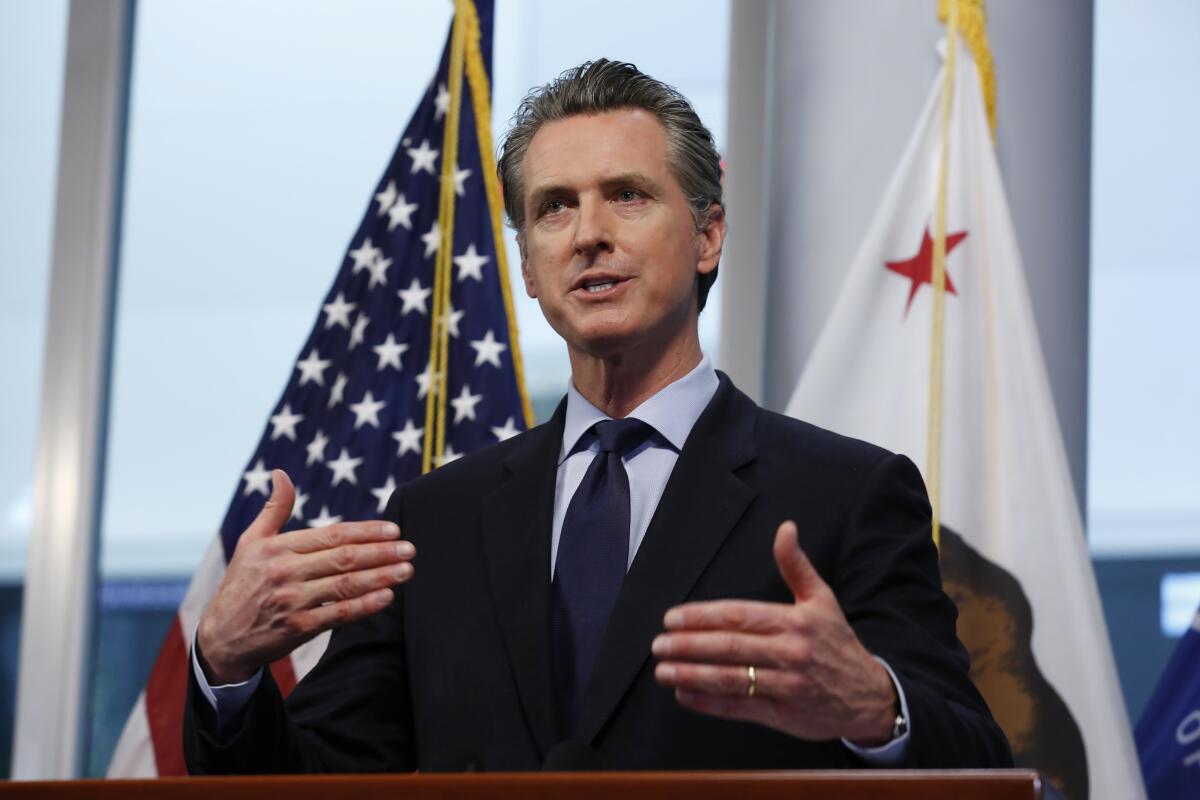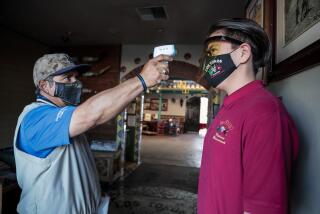Newsom resists pressure to ease California’s coronavirus stay-at-home order

SACRAMENTO — Gov. Gavin Newsom on Monday acknowledged that pressure from Californians and local governments is building to modify the statewide stay-at-home order carried out to stem to spread of the coronavirus, but he said restrictions will remain in place until the threat to public health subsides and adequate testing and other safeguards are implemented.
A bipartisan group of elected officials from San Luis Obispo County on Monday asked Newsom to grant them the “authority to implement a phased reopening of our local economy,” a request that comes just days after Ventura County officials modified a stay-at-home order to permit some businesses to reopen and some gatherings to take place.
Officials in San Luis Obispo County argued that their COVID-19 infection rate has been declining because residents have been diligent in adhering to stay-at-home orders and maintaining social distancing practices, but with businesses shut down and so many people out of work, the county faces a perilous financial outlook.

As a result, officials requested approval to “begin a science-based, thoughtfully phased reopening of our economy.”
“We have asked our residents to take these desperate measures because of the unique risks posed to the broader community by this virus so that we can flatten the curve and allow our healthcare capacity to catch up,” they said in a letter to the governor. “Now we need to move to the next phase, which is economic recovery.”
Newsom said that while areas across the state have been affected differently by the pandemic, the “virus knows no jurisdiction, knows no boundaries” and could easily spread into neighboring counties if restrictions are eased prematurely. It’s critical to the collective well-being of all Californians to have a statewide, health-based strategy to return to some sense of normalcy, he said.
“None of these local health directives can go further or, rather, go farther backward than the state guidance,” Newsom said during his daily COVID-19 briefing on Monday.
Newsom said he expects many more requests similar to the one from San Luis Obispo County. He promised that his administration will discuss each with local officials “to make sure it’s a health-based decision. Not any other type of decision-making. Health first, science and data. Everything else follows from that.”
Meanwhile, dozens of protesters gathered Monday outside the Capitol demanding that the state lift restrictions and allow people to return to work, one of a number of demonstrations that have cropped up throughout the state in recent days. Demonstrators also have descended on Huntington Beach, San Clemente and San Diego County.
Sorry, liberators. Court rulings have firmly established that public health closures — like our current coronavirus shutdowns — are constitutional.
Newsom said he understood the frustrations and anxieties being expressed by the protesters. But he cautioned that parts of the world that have relaxed coronavirus restrictions prematurely, including Singapore, have been quickly hit with a second wave of the virus.
“If we’re ultimately going to come back economically, the worst mistake we can make is making a precipitous decision based on politics and frustration that puts people’s lives at risk and ultimately sets back the cause of economic growth and economic recovery,” Newsom said.
The Newsom administration last week announced the six key indicators for altering the governor’s stay-home mandate, including the ability to closely monitor and track potential cases, prevent infection of high-risk people, increase surge capacity at hospitals, develop therapeutics and ensure physical distance at schools, businesses and child care facilities.
Newsom said he will provide an update on Wednesday as to where the state stands in each of those key areas, including the progress California is making in widespread testing.
More to Read
Sign up for Essential California
The most important California stories and recommendations in your inbox every morning.
You may occasionally receive promotional content from the Los Angeles Times.












